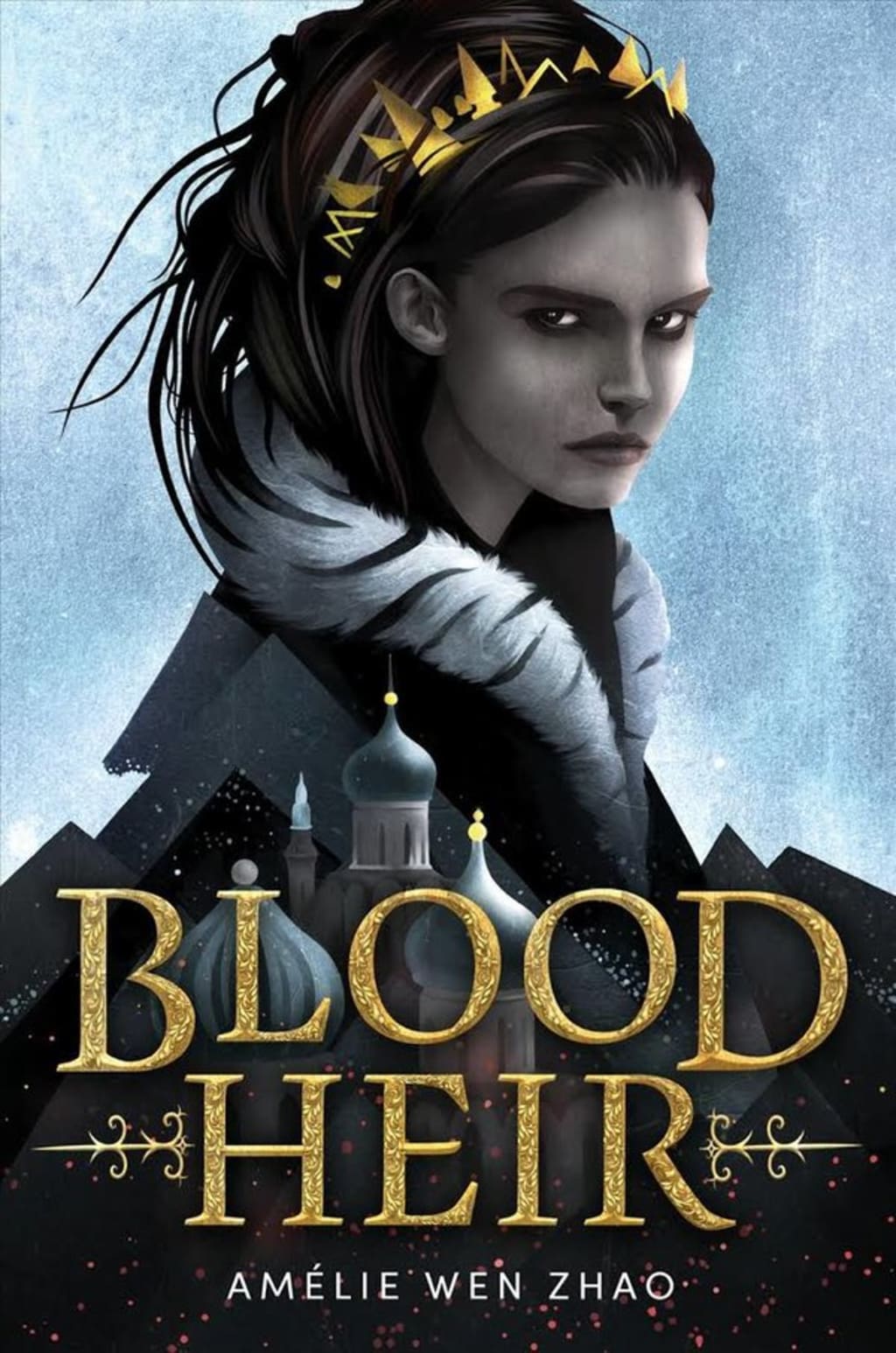Blood Heir: A Controversy
A review of Blood Heir and the surrounding controversy

The Blood Heir is the first installment in a yet to be announced trilogy recently released by Amelie Wen Zhao. It follows a disgraced and betrayed princess named Ana as she travels her kingdom trying to find her fathers murdered and clear her name of the crime. But Ana carries a deadly secret in the form of an "affinity" or power over blood. Ana begrudgingly teams up with an infamous con man named Ramson Quicktongue. The two's fate seems intertwined as they end up finding their way back to each other over and over throughout the book. And yes, they definitely are love interests.
As some may have noticed Blood Heir sparked some major controversy out in the Twitterverse that caused so much of a storm the author not only put out an official apology but also cancelled the book. Blood Hair was supposed to be released in June of 2019 but after being "publicly" condemned by many authors and potential readers Amelie Wen Zhao asked Delacorte Press AKA Penguin Random House to put the book on hold and released an apology letter on twitter.
What could cause such a backlash? Many people claimed that the book was anti-black and was trying to profit from or make fun of slavery. Others even went so far as to accuse her of plagiarizing other popular books. But really, it all began with @LegallyPaige accusing Zhao of compiling screenshots of people who didn't like her book and harassing them. Yet despite all the uproar Delacorte Press released a statement saying they had full intentions of continuing to work with Zhao and publish the book when she decided to release it. This date happened to be November 19, 2019 and the book is currently in stores world wide.
So let's break down the controversy. @LegallyPaige started the whole thing with the tweet: “I’ll tell you which 2019 debut author, according to the whisper network, has been gathering screenshots of people who don’t/didn’t like her book and giving off Kathleen Hale vibes: Amelie Wen Zhao.” Obviously there was a large back lash over this tweet as only the sample copies had been released to a limited number of people. However the tweet was otherwise unfounded and lacked any evidence to support the claim. Pretty quickly after that @LegallyPaige made their account private and wasn't heard from again on the matter.
Of course that was just the spark people needed and soon enough the floodgates opened as other accusations of the book being anti-black, offensive to African Americans, and plagiarism started rolling in. Soon enough there was a bonified "twitter mob" out for Zhao. Two YA novelists where particularly leading the charge. Author L.L McKinny claimed that the book was "pretty much" about slavery and the oppression of black people. Here's her tweet:
Explain to me how you write a book pretty much about slavery and oppressions suffered by the Black community, such as a system that uses not only slaves but people "arrested' by the authoritative system in place to be used as relatively free labor, but "oppression is blind to
— LL McKinney (@ElleOnWords) January 28, 2019
However, upon reading the book I find her claims to be baseless. Yes that is a major theme of the book but it's also a reality many face. It's often that the oppressors are blind to the plights of the ones they oppress and there is absolutely nothing to say it's about slavery or racism specifically. In fact the argument could be made that it's more about child labor (a character names May was forced to work after coming to the country looking for a better life and Ramson was also exploited to work as a child) then slavery. In fact, Zhao addressed this in her apology letter stating that she was drawing from her own cultural heritage of China's history and ongoing issues with indentured labor and sex trafficking. And let's face it, that is a pretty large part of their history. To get a better picture here is Zhao's official apology:

LL McKinney wasn't done with her criticism yet though as she had a particular problem with the summary of the story: "In a world where the princess is the monster, oppression is blind to skin color, and good and evil exist in shades of gray…comes a dark Anastasia retelling that explores love, loss, fear, and divisiveness and how ultimately it is our choices that define who we are." We can't exactly say the line "oppression is blind to skin color" isn't an iffy line that explores many issues surrounding our own society but it can also be said that this is simply setting up the setting of the world. One that is both similar to ours and foreign at the same time.
Ellen Oh was the second author to attack Zhao, though her comments where appearing to be more aimed at general authors then directed at Zhao herself. She appeared tweeting "Dear POC writers, You are not immune to charges of racism just because you are POC. Racism is systemic, especially anti-blackness. And colorblindness is extremely tone deaf. Learn from this and do better." While her statement may have been true it was still unfounded and based on what others assumed the book to be about. Oh later applauded Zhao for cancelling the publication of her book.
That should be all for the racial insensitivity right? WRONG!! YA twitter also seemed to have a problem with a specific part of the book. They claimed that in chapter 21 a black character was rescued from slavery only to be killed off to progress the main characters fight for justice. There's just a few issues with this. This first is the side character, May, they're referring too wasn't exactly "rescued" and was more "assisted". You see, while in captivity May joined an Affinite freedom force and assisted two other members with freeing the Affinites in that particular slavery spot. While she did die and it did help progress Ana's fight for freedom there was one more issue twitter seemed to miss. The fact that no where in the book was May described as black.
Weird huh? But true. May was descried as having "ocean blue" or "aquamarine" eyes, brown curly hair, and "bronze" or "tan" skin. None of this particularly screams "she's black!".
But wasn't Zhao also accused of plagiarism? Yep. There's actually two accounts where people are calling foul. The first is in the second book of The Lord of the Rings where Sam called out to Frodo: “Don’t leave me here alone! It’s your Sam calling. Don’t go where I can’t follow!” and Ana whispers to May: “"Don’t.” Ana was crying freely. “Don’t go where I can’t follow”. The thought to Ana doing this is in the earlier chapters where we are first introduced to May the girl stated "Don't go where I can't follow" after Ana wakes up from near hypothermia after escaping prison with Ramson. The symmetry in the story had a nice touch. This particular line is actually used often in writing and can be traced back to the Bible if people want to get particular about it.
The second account was in The Hunger Games. In The Hunger Games, Katniss sings to Rue as she dies and then buries her by covering her with flowers. The parallel here is that Ana sings May a childhood song as she dies and then, after carrying the body to safety, buries her in someones back yard that was full of flowers. While the similarities are there, they're just different enough to not be considered plagiarism.
In fact, you could make an argument that The Hunger Games itself is plagiarism as it loosely follows the same outline as another book called Battle Royale by Koushun Takami. Battle Royale was written in 1996 but wasn't published until 1999 in it's original Japanese and 2003 in English. In this book teenagers are chosen by random classes and dropped in remote locations, made to kill one another until only one is left. It even includes the "contestants" being monitored and watched by those running the battle, changing conditions, a fight against those in charge for freedom, and one character being taken under another's wing in the fight for survival. Hell, it even included one person with a meaner personality being eager to participate just like those in Area 1 where.
In the end, none of the allegations around the book have any real evidence to support their claims. The book itself is well written and draws on many of the readers emotions, able to easily tug on the heart strings or make you fall in love. But in the end you'll have to read it for yourself and draw your own conclusions about it.
About the Creator
Lilli Behom
I have no idea what I'm doing but I'm always down for spooks.






Comments
There are no comments for this story
Be the first to respond and start the conversation.